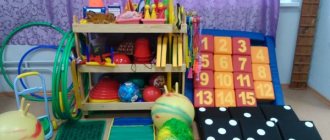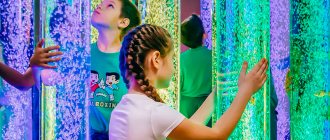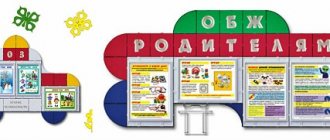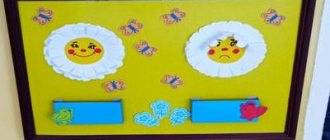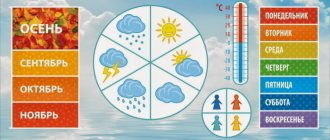Work in the middle group
With children 4-5 years of age, the music worker not only learns songs and dance movements, but also teaches children to play simple musical instruments and involves them in play activities.
For example, as part of a lesson aimed at learning strings, wind, and percussion instruments, preschoolers are invited to try themselves as performers of certain rhythmic compositions. During the game, the teacher first voices a rhythm, then the kids try to repeat it one by one. This technique contributes to the early identification of musical and talented children and their subsequent development. The teacher encourages children to improvise in various types of musical activities: dance composition, melody, chant.
Features of creation
To begin with, let’s analyze the possibility of artistic and aesthetic development of children in a preschool institution. Musical corners in kindergarten are a way to inform children and parents about the impact of art on the development of the emotional qualities of children. Thanks to music classes, children develop diversified, improve their oral speech skills, and improve their auditory perception.
By mastering rhythm skills, it will be easier for children to learn mathematical operations while studying at school. At the age of 1.5-3 years, preschoolers acquire the skills of extracting sounds from simple musical instruments and consciously use the terms “ri.
The teacher periodically updates the music corners in the kindergarten, placing relevant and useful information in them.
Goals of creating a music corner in a preschool educational institution
It consists of instilling and improving the individual abilities of preschoolers, developing the skills of emotional response to musical and song images. The teacher instills in his students a culture of listening to music. The teacher himself decides what to call the music corner in kindergarten. It is desirable that the name resonates with the art. For example, you can design a corner “Merry Notes”, or create a “Song Gallery”.
Children, after listening to vocal or instrumental performances of rhythmic melodies, try to convey their meaning through movements or words. This helps improve their communication skills.
Musical games for children are aimed at developing logical thinking and perseverance. For example, in the game “Repeat After Me,” kids make the same movements to the music as their teacher. As soon as the music stops, they must sit on the chairs and “hide in their house.”
Children are happy to be involved in all musical activities in kindergarten and become active participants.
Forms of musical work in preschool educational institutions
Among them, we note integrated and standard classes. A music corner in a kindergarten, the design of which is undertaken by the music worker himself, contributes to the children’s positive attitude towards the lesson. The teacher only accompanies the children to class and acts as an organizer.
The children come to the music room in kindergarten with him. Rhythmic and musical games, listening to songs and compositions are also included during walks and excursions.
Components of work
The vocabulary of preschoolers aged 5-6 years includes the following musical terms: forte, minor, piano, major, staccato, legato. It was during this period that children’s ideas about the musical culture of various peoples of the world expanded. In the music corner, children actively participate in instrumental work. For example, they learn a melody and even try to perform it with an orchestra. In order to increase the educational and educational effect of such activities, the children, under the guidance of their “conductor,” perform in front of their fathers and mothers. Of course, involving preschool children in joint work is an important aspect of developing their active citizenship, and therefore, full compliance with the state order. Children who acquire teamwork skills from early childhood feel responsible for their actions, which makes it easier to establish relationships with other people.


